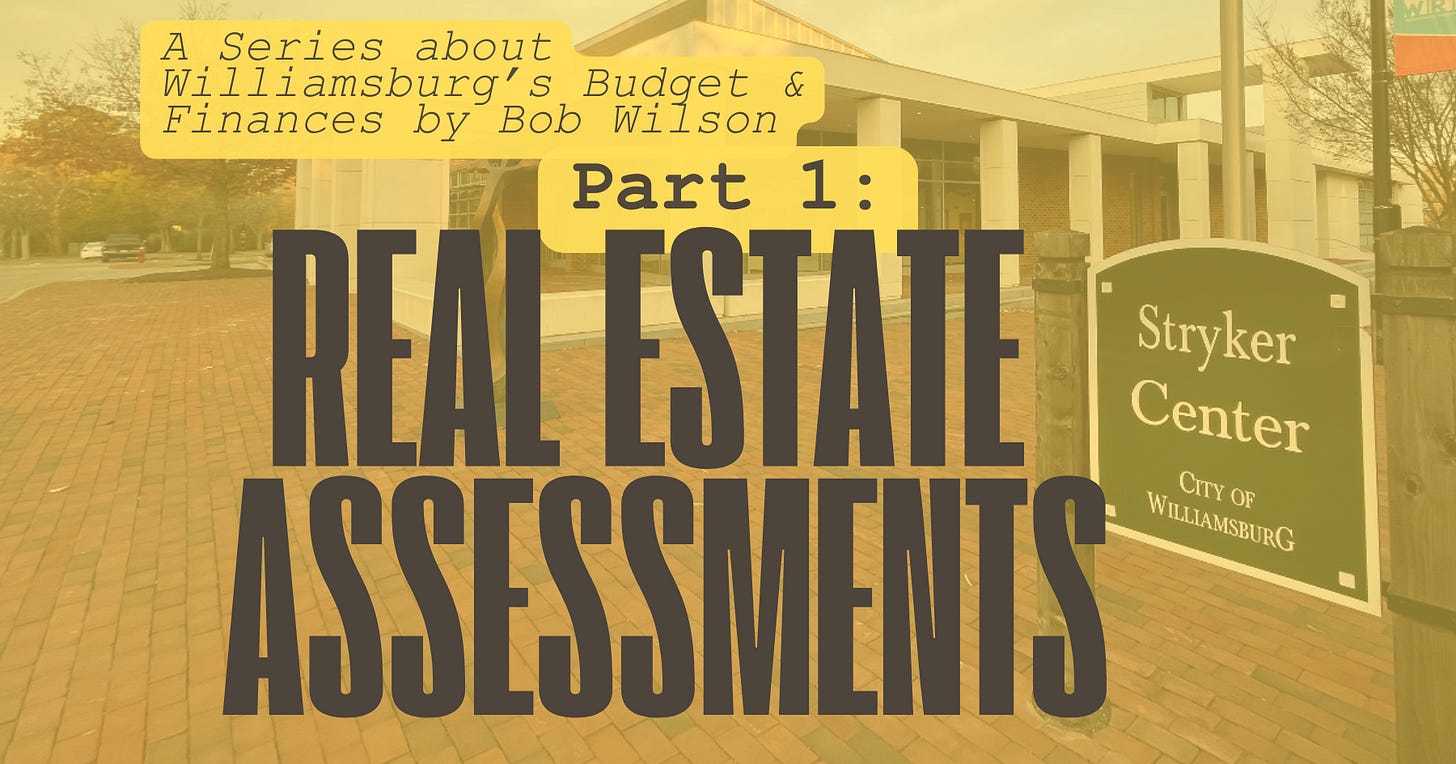GUEST COMMENTARY: Rising Residential Real Estate Property Assessments & Increased Spending
PART 1 in a series about Williamsburg’s Budget & Finances by Bob Wilson
The City of Williamsburg will hold their annual Budget Retreat in the Fire Station Operations Room beginning at 8 am on Friday, February 14, 2025. The Public is invited to attend.
The City has recently issued their Annual Comprehensive Financial Report for the Year Ended June 30, 2024, and since fiscal 2025 is not yet complete, this provides the most current source for looking in depth at City finances. In order to inform and educate local residents regarding the City’s FY2026 budget issues, we plan a multi-part series looking at various aspects of the City’s operations and its budget for next year. This is the first of such series, which provides a few key takeaways.
Real estate tax revenues have skyrocketed in recent years
City leadership often trumpets its low tax rate. The latest budget report says, “The City of Williamsburg takes pride in providing a high level of public services to its residents at a reasonable cost. The real estate tax rate of 62¢ per $100 of assessed value continues to be the lowest city tax rate in Virginia.” At the same time, the city acknowledges that real estate taxes paid by City residents in recent years have skyrocketed, due to double-digit average increases in residential real estate assessments. In fact, In 2024, residential real estate assessments increased by an average of 23.8% while commercial property assessments only increased 3.7%, for an average increase in assessed values of 16.6%.
Increased revenue, increased spending
Of course, City residents have seen no relief in a reduced property tax rate in response to increased assessments. The 2024 budget report states the “increased revenue was primarily used to bolster strategic reserves to provide a buffer for future economic uncertainty, invest in personnel via salary increases and benefit enhancements to address sector-wide staffing challenges, and to cover increased funding requests from schools also related to staffing challenges.”
Overall revenues from Total Governmental Activities increased from $33.3 million in 2015 to $57.1 million in 2024, and revenue from General Property Taxes make up the majority of the increase. The City did not break out increased real estate assessment values from new construction versus increases in assessments on existing property in their Financial Report. New construction and developments certainly contributed to the $24 million increase in property tax revenues since 2015. However, it is reasonable to conclude that the majority of the increase in revenues came from increases in residential real estate assessments and tax rate increases over the years. For example, single family residential made up over 50% of property tax assessments in FY2023, and the City’s population grew by only 815 people since 2015. In Fiscal 2023, only about 4,500 real property owners contributed to the City’s real estate tax base. In FY2024, tax revenues made up 86% of all Governmental Activities Revenues.
It also should come as no surprise that the College of William & Mary and Colonial Williamsburg are largely exempt from City property taxes. Combined the exempt real estate value was approximately $900 million or around $6 million in taxes. Colonial Williamsburg does pay property taxes on its commercial properties which were valued at around $340 million, paying about $2.1 million in real estate taxes to the City.
Preview: City finances and budget, Part 2
In the next Part of the City finances and budget series, we’ll take a look at how the City has not only spent the additional $24 million in additional governmental revenues, but also the additional $33.7 million in bond borrowings over the same period.
About the Writer: During a 45-year career, Robert Wilson worked with senior leadership teams to develop and implement innovative strategic and business plans that have fostered growth and profitability. His background includes direct profit and loss responsibility, forging effective multi-functional leadership teams, restoring organizations to sound financial footing, and implementation of best practices initiatives. He has demonstrated a mastery of turnarounds and troubled companies in a variety of business sectors.
Prior to retiring in 2021, Mr. Wilson was Co-COO of a $2 billion operating division of a Fortune 500 Company. He has held the positions of CEO, President, COO, and CFO in several regional and national organizations during his career. Since retiring from corporate life, Mr. Wilson has served as an adjunct instructor in the business school at Christopher Newport University.
Mr. Wilson holds a BBA degree from the College of William & Mary, a MS in Finance degree from the University of Arizona, and a Doctorate in Management from the University of Maryland Global Campus. He is a member of the Beta Gamma Sigma honorary business fraternity. Since 1979, he has held a Certified Public Accounting license in the Commonwealth of Virginia (currently inactive) and is a member of the American Institute of Certified Public Accountants and an original member as a Chartered Global Management Accountant.
Mr. Wilson resides in the City of Williamsburg and may be contacted at wilstar2001@gmail.com.




